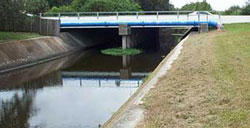 October 1, 2014 - Dr. Ni-Bin Chang, Professor and Director of the University of Central Florida’s Stormwater Management Academy, Rahim Harji, Pinellas County’s Watershed Management Unit Manager, and Thomas Ruppert, Florida Sea Grant Coastal Planning Specialist, were awarded a grant from Florida Sea Grant titled “Coupling Risk and Resilience Assessment for Networked Sustainable Drainage Systems in a Coastal City under Climate Change Impact.” The team will assist Pinellas County to implement an effective, efficient, and resilient stormwater system in the Cross Bayou Watershed of Pinellas County that increases infrastructure resilience and robustness by incorporating low impact development (LID) controls and flood proofing technologies to harmonize existing storm sewer systems under climate change and sea-level rise scenarios.
October 1, 2014 - Dr. Ni-Bin Chang, Professor and Director of the University of Central Florida’s Stormwater Management Academy, Rahim Harji, Pinellas County’s Watershed Management Unit Manager, and Thomas Ruppert, Florida Sea Grant Coastal Planning Specialist, were awarded a grant from Florida Sea Grant titled “Coupling Risk and Resilience Assessment for Networked Sustainable Drainage Systems in a Coastal City under Climate Change Impact.” The team will assist Pinellas County to implement an effective, efficient, and resilient stormwater system in the Cross Bayou Watershed of Pinellas County that increases infrastructure resilience and robustness by incorporating low impact development (LID) controls and flood proofing technologies to harmonize existing storm sewer systems under climate change and sea-level rise scenarios. This project is motivated by the fact that there are no standard methods/criteria/matrices to measure the sustainability of coastal stormwater sewer systems in terms of resilience and robustness in association with varying risk levels of episodic disturbances including climate variability and sea-level rise scenarios. This project proposes a new concept, the networked sustainable drainage systems, which are featured by ‘system of systems’ or "network of networks" characteristics (i.e., with cascade effect) that should be less vulnerable to flood impact under climate variability and sea-level rise. The project will provide a suite of quantitative tools and methods to build an innovative platform via coupling the risk and resilience assessment to pave a pathway for producing adaptive stormwater management strategies for Pinellas County Government. This advancement will: 1) inform the County engineering solutions to flood hazards, 2) allow Pinellas County to implement its current policies seeking to promote LID, 3) serve as a model for innovative stormwater management technique in the County, 4) incorporate climate change and sea-level rise impacts into stormwater infrastructure in the County, 5) review policies or plan of the County for a better cost-benefit-risk trade-off for stormwater management in the County, 6) deliver the final products to local and regional partners by a series of outreach activities, and 7) disseminate new knowledge to help the County optimize future planning and design of networked sustainable drainage systems.











